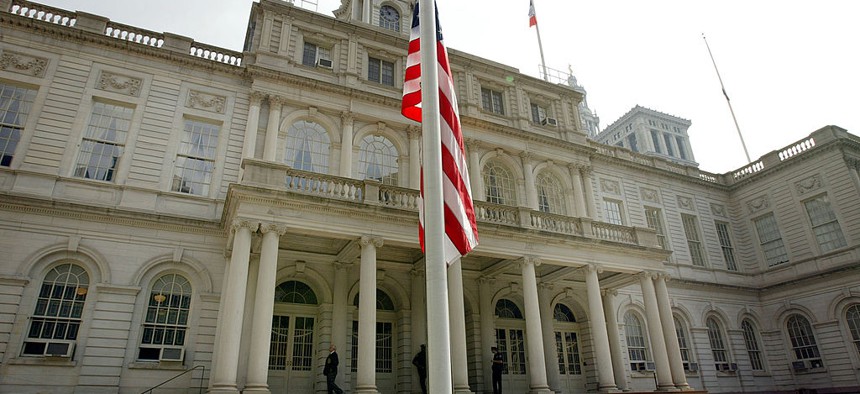Real Talk: Clearing the backlog is only the beginning
One nonprofit ED whose organization was at the edge of the financial abyss reports that “funds have begun trickling in from the city.”

New York City Hall Photo by Spencer Platt/Getty Images)
There are continuing signs that New York City is serious about cleaning up its contracting mess. Two weeks ago Deputy Mayor Sheena Wright sent a widely disseminated email, outlining in detail a plan to clear the backlog. We are also hearing from nonprofits – at least anecdotally – that things are getting better. As one executive director whose organization was at the edge of the financial abyss just a few weeks ago said, “At long last, funds have begun trickling in from the city.”
Let’s hope for the best and assume that this one-time backlog-clearing process is successful and that systems are put in place to prevent backsliding. One seemingly easy part of this would be to create a publicly accessible database – like New York City Comptroller Brad Lander’s CheckBookNYC dashboard for tracking government spending – showing information about contracts that have been awarded but not registered. If the data were available and downloadable it would be a trivial matter to compare agencies, spot emerging trouble spots, etc. The same data would allow nonprofits to track the status of their contracts.
In normal times clearing the backlog would be enough, but these are not normal times. The city faces problems that demand immediate attention in areas like mental health, homelessness services, education, criminal justice – where nonprofits play a vital role. We also have a new mayoral administration and a record number of new council members who, quite naturally, are likely to want to do lots of new and different things with lots of new and different nonprofit partners.
However, most elected officials have never run a nonprofit and likely don’t appreciate just how poorly our procurement systems are for doing new or big or quick things – even if the epidemic of late registration is under control. There are a few reasons for this:
- New contracts: There is no past to borrow from
In a steady state, nonprofits can use the money they should have received last year to pay the bills this year (Of course, they should not have to do this. The city should register contracts promptly and pay advances, but the reality is that nonprofits often make zero-interest loans to the city by getting paid this year for last year’s work.) But when a program is new, or has grown significantly, there is not enough “last year” to pay this year’s bills.
- Changing contracts: Death by amendment
Growth or change in programs often involves multiple amendments to existing “base” contracts. City agencies often process these amendments one by one, rather than allowing multiple amendments to be combined or at least submitted in parallel. In addition, nonprofits generally can’t claim against a new or renewed contract until all the outstanding amendments have gone through. This can create significant delays even if the individual amendments are processed in a timely manner.
- Seasonal spending: It’s now or never
For annual or multi-year contracts, a three-to-six-month delay in registration and payment may be manageable. However, some work is concentrated in a much shorter span of time. For example, the summer is a busy time for out-of-school, youth employment and violence interruption work. For these shorter contracts, even a three-month delay means that substantially all the work will have been completed, and the expenses incurred, before the contract is registered.
- Emergency decrees: Punishing the First Responders
When the city uses emergency decrees to provide vital services it only applies to the award of the contract, not its registration or renewal. As a result, the groups willing to step into the breach can face the greatest financial hardship.
These issues make new, growing or quick programs difficult for even the largest groups to manage. They make it next to impossible, for smaller community-based organizations that are often the best positioned to do the work. The city knows this and in special cases is working to help put in place financing from third-parties so that some smaller groups can deliver some programs in advance of getting paid but these one-off band-aids, while welcome, will never be enough.
Bottom line, it seems like things are getting better, but there is much more to do. We must all hope that the political will exists not only to clean up the prior mess but to help make it easier for the city and its nonprofits partners to work together in the future.